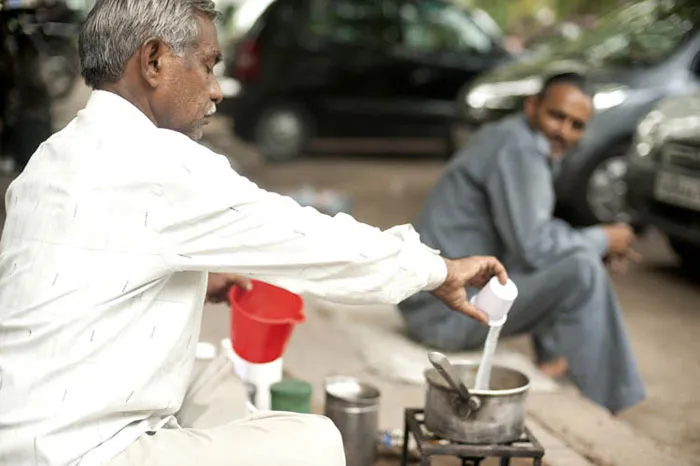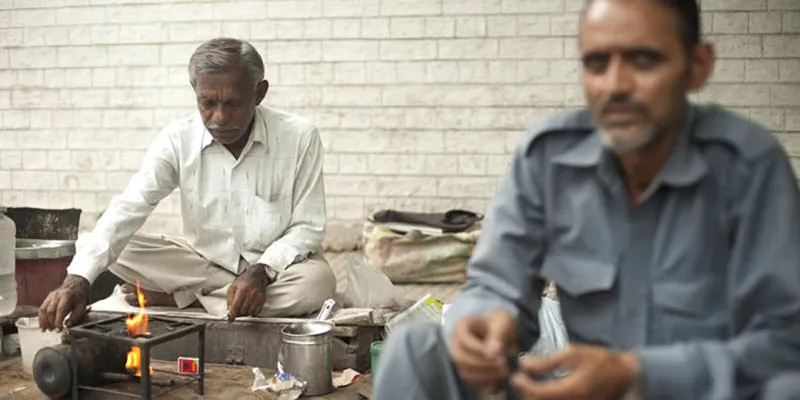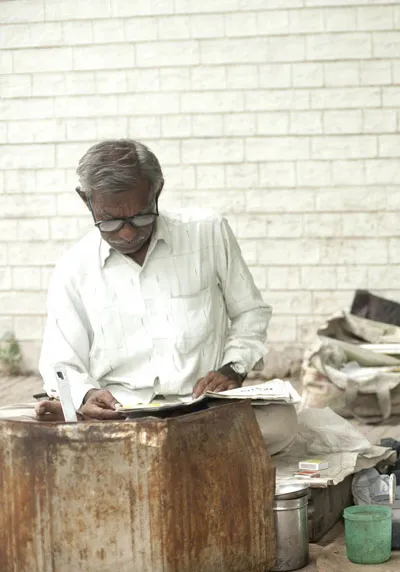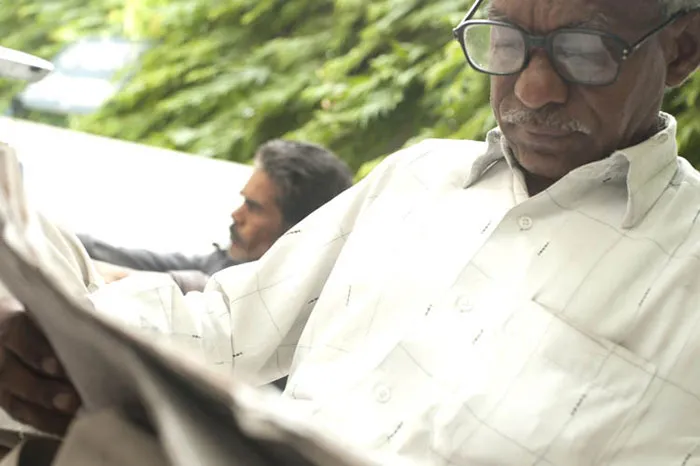This Delhi roadside chaiwalla cycles 100 km a day to peddle his 24 books
He is an author of 24 books. Out of them, 12 have been published and six have gone into reprint. His novel Ramdas even won the Indraprastha Sahitya Bharti Award. Laxman Rao, 62, scribbles whenever he can and has been doing so ever since he was a teenager. He published his first book in 1979. Those who know him call him Lekhekje and this makes Laxman Rao a very happy man.

But for others, Rao is just another chaiwalla sprawled out on the Delhi pavement with his tin-pot kettle and crusty tea-glasses. Writing books may be Rao's passion, but it earns him no bread. To make ends meet he sells tea for one rupee a cuppa. And while doing so he has to keep an open eye out for the MCD evacuation squad which has displaced his make-shift stall once already. He has been a tea seller since the last 25 years. Before selling tea, he worked as a dishwasher, a construction labourer and a domestic help.
In all these years of doing odd jobs, Rao has been writing books with an unflagging passion. He is indeed a sad commentary on the value of the artist in the country. Rao's situation also reveals the great disparity between the rich and famous writers writing in English and those Hindi or vernacular writers like him living in abject poverty and oblivion.
Remarkably, Rao is without any complaints. He is a true reader's writer and happy as long as people read his books. To ensure that the readers get his books, he cycles over 60 kilometres every morning from one end of Delhi to another hawking his books in educational institutions and libraries. Those who buy his books seldom realise he is the author.
Looking at me no one can tell that I write books. They look at my ramshackle cycle, my worn out clothes smudged with dirt and sweat and think I am just another peddler. I don't tell anyone it’s my book until they inquire about the author,
he says. And when Rao reveals his identity to an inquisitive buyer they are shocked and quickly offer Rao a chair and tea.
Turned down by publisher
It needed an incident to fire Rao into publishing his books. A publisher insulted him and summarily dismissed him from his office without looking at his manuscript. From that day, Rao decided to publish, market and promote his books on his own. He spends over Rs 25000 in publishing 1000 copies of one book. “Whatever I earn from the sale of one book goes into publishing another,” he says. But Rao is serious about publishing and vows to publish his remaining 13 unpublished books in the coming years. He has a registered publishing house called Bhartiya Sahitya Kala Publications with an ISBN number to boot.

Besides publishers, Rao approached various literary societies with his books but everyone shooed him away without even taking a look at his work. For them, his personal appearance was a measure of his worth. His posturing of a literate man who not only reads but also writes books gets the worst out of the most educated of men. Rao even enrolled for a graduation degree to win acceptability. He was a construction labourer and studied for his graduation through correspondence under the street-lights after work at night.
He finally got his degree at the age of 42. But people were not interested in his BA certificate. “No one wants to believe that a poor roadside chaiwalla can read and write books too. They say if he is a writer what is he doing on the pavement.'' Ironically, Rao, the author of nearly 20 books in Hindi, sells tea on the pavement outside Hindi Bhawan, the repository of Hindi literature. He is virtually an untouchable writer and the rarefied environs of the Hindi Bhawan are not for the likes of him.
Happy to love books
Rao mostly does the rounds of schools cycling as far as Rohini and Vasant Kunj from his stall in Vishnu Digambar Marg near ITO. The stall is open-air and make-shift. It has the bare minimum which includes the rusty kerosene stove, two-three tea utensils, a plastic mug, and a few styrofoam cups. He also displays his five published books at his stall. When it rains, Rao has to abandon his stall and rush to the boundary wall behind him – push a plastic cover between the wall and his cycle and improvise some sort of a shelter for himself and his books.

He cycles to his stall in the morning and hands the charge to one of his two sons. He then picks up a bagful of books and heads for the schools earmarked for the day. He only takes over from his son late in the afternoon. There are over 800 big and small schools on his list and he has visited them all. Over 400 of these schools have bought some of his books and stock it in their library. Four hundred others rejected them. He says,
Sometimes if a teacher tells me to get out I don't get angry I think it may be his bad day and I visit him again after a few days. I keep on trying until they are ready to take a look at my books.
Rao chooses to make the excruciating journey in the crushing traffic and the scorching sun on his cycle as he cannot afford the bus and the rickshaw fare to reach the schools on his list. Writing books and then selling them is, in fact, a drain on his time and resources. But Rao does not think this way. “I am not interested in making money. I am happy to be a poor writer than be a rich man with no love for books,'' he says.
Rao writes in the night in his one-room tenement he shares with his wife Rekha and two sons Hitesh and Paresh. Rao wants his sons to acquire the maximum education they can. During the initial years of their marriage, Rekha remained puzzled by her husband's obsession with reading and writing but when she saw his dedication she came around. “A lot of people thought I was crazy. They still do – but the number is fewer now,'' he says. The other peddlers and chaiwallas on Vishnu Digambar Marg do not know what to make of Rao. “Their behaviour around me is cautious and uneasy. They know I am neither a chaiwalla like them and neither a hot-shot writer with fame and fortune,'' he says.
A runaway
In Maharashtra, where he was born in Amravati district, his three brothers have done comparatively well for themselves. One is a lecturer in a college. The other is an accountant and the third one looks after the family farm. “I ran away from home with 40 rupees in my pocket. I wanted to see the world. Learn things. Read and write books,'' he says.

In Bhopal, where Rao first went to look for work, he was a domestic servant in a house doing all chores from sweeping and mopping the floor to doing the dishes. In return, he got food, a roof over his head and most importantly an education. “I was allowed to go to school and I completed my matriculation working here,'' he says.
Rao came to Delhi in 1975 and picked up whatever work came his way. For many years, he worked as a labourer in a construction site and as a dishwasher in road-side dhabas. From 1980s till today, Rao has been selling tea. But Rao's world revolves around the world of books. “I used to spend my entire Sundays in the flea-market in Daragunj selecting books to read,'' he says. Reading exposed him to not only Indian writers but also to Shakespeare, Sophocles and Bernard Shaw.
There are many people who don't need an excuse to chat up Rao over a cup of tea. These are people who have read his books. Many people from different offices in Vishnu Digambar Marg know about Rao's books and come around during recess or before and after office to talk with him over tea. But it’s not only the office-goers in Vishnu Digambar Marg who visit Rao. Some like Sushil Sharma makes it a point to drop by Rao's after his office.
“My office is in Safdarjung Enclave and I drive my scooter here especially to Rao's shop. The idea is not to have tea but to spend some quality time with someone. I exchange news, views and opinions with Rao and go home a richer man,'' says Sharma, a manager in a private office.
Besides the educated elite, there are others on Vishnu Digambar Marg doing menial jobs whom Rao has infected with the reading bug. Shiv Kumar Chander, a security man outside a building, loves Rao's books. “I enjoy reading his books. Especially his two novels, Narmada and Ramdas. I gave it to my father to read and he loved it too,'' says Shiv Kumar. Shiv Kumar says he was introduced to Rao's books by another security guard in the area.
Rao's books are all in the first person singular and revolve around some struggle. No it is not the financial struggle that Rao faces every day. Most of his protagonists are rich and well within reach of every luxury. Their struggle is metaphoric. They seek to achieve greater things like love, artistic merit or greatness. He says,
My books are not based on my life but I like to think that my books are realistic. They are based on what I see around myself.
(Photos by the author)







